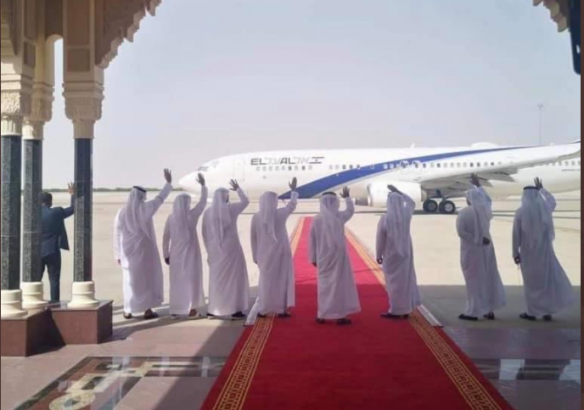Koby Huberman is co-founder of the Israeli Regional Initiative Group, which advocates a regional approach for a two-state solution and end of the Israeli-Arab conflict. In this insightful essay, Koby explains how the Israel-UAE agreement is a potential game-changer for the region and if utilised by the parties correctly, could kickstart a new initiative for a regional dialogue between Israel, the Palestinians and Arab states for the advancement of the two-state solution.
The UAE-Israel normalisation agreement, which was announced on 13 August 2020, is a real ‘line in the sand’ in the Arab peninsula deserts, and in fact in the entire Middle East. Many traditional paradigms shifted that day, as the agreement broke the basic assumption that normal relations between Israel and Arab Gulf states can be established only when a Palestinian state is formed, as stipulated in the 2002 Arab Peace Initiative (API).
I believe this is a historic event which cannot be under-estimated. For more than 10 years my colleagues from the Israeli Regional Initiative Group have passionately promoted the idea that the way to solve the Israeli-Palestinian conflict requires the engagement of moderate Arab states. We believed that the only way to reach the two-state solution (which is the most desired end-game for the conflict) is by embedding it in a regional framework that engages Arab states and Israel in a number of agreements – to foster regional security, regional economic development and regional normalisation. (For more on this see my Fathom essay from Spring 2017).
A win-win-win scenario
In my discussions with senior Emiratis over the past few years, I realised that they are committed to the same geo-strategic objectives as Israel, as well as being concerned by the same threats: blocking Iran and its regional proxies; combatting terror and fundamentalism; and recently, confronting Turkish and Muslim Brotherhood’s aspirations in the region. Furthermore, we also saw the looming risks and threats of the Middle East’s failing economies, which will drive millions of young people to life of poverty, no hope, no education – and eventually pushing them to fundamentalism, terror organisations and fanatic extremism.
Yes, the agreement represents a triple win-win-win deal, with immediate political gains for all parties. Prime Minister Benjamin Netanyahu and Israel win a major step forward in the effort to normalise relationship with the Arab world and strengthen Israel’s position vis-à-vis Iran and other shared threats. Crown Prince Mohammad Bin Zayed and the UAE scores a huge achievement in showing the Arab world and the Palestinians in particular, that it was able to eliminate the risk of unilateral annexation, upgrade its relationship with Israel and capitalise on its brave move in terms of US military support as well as international diplomatic clout (in fact, the agreement arguably turned the UAE into the shining star of inspiration for a hopeful, reasonable and pragmatic Middle East). And finally, President Donald Trump and the US are able to show a major diplomatic achievement – perhaps the only one during Trump’s first term.
Yet the normalisaiton agreement this is not just a tactical step that serves short-term objectives. It is a substantial evidence of two key trends that have emerged in the region during the past two decades, combined with a third recent game changer:
- Israel is now an unshakable reality in the Middle East – it is respected and accepted by major regional forces. Note, that out of the Arab Quartet countries, Israel now has peace treaties with three (Egypt, Jordan and the UAE), while only Saudi Arabia is still out (while keeping its informal relations quietly beneath the table).
- Geo-strategic and economic interests matter more than ideology – the UAE followed a pragmatic calculation of its own interests and was less concerned by the Arab League’s ‘rules of non-engagement’ with Israel, as stipulated in the API.
- The COVID-19 pandemic changes the agenda of the regional players, as they need to build healthcare, food security, water, scientific and technology cooperation. The realisation of this new reality requires thought leadership and bravery to overcome past paradigms.
Yet, one conclusion should not be drawn out of this surprising move: we must not assume that the Palestinian cause will now be brushed aside and left behind. The Emiratis clearly understand that Netanyahu has little appetite, if any, towards reaching a two-state solution. At the same time, they also know that the current Palestinian leadership is incapable of making the right and tough decisions. So, instead, they smartly chose to prevent the annexation threat (permanently or at least for a reasonable timeframe), thus securing a lifeline for the two-state concept, realising that only new circumstances will be required to push it forward. And most probably, different leaders.
While we should definitely celebrate the deal and look at it as a historic event, we cannot ignore the Palestinian issue. First and foremost, it has significant and risky implications on the future nature and identity of Israel, and Israel’s own interest is to find a solution to the Palestinian conflict – in order to prevent a one-state reality with no Jewish majority between the Jordan River and the Mediterranean. Clearly, the current Palestinian leadership has consistently refused to engage and thus led its people to a frustrating crisis. Yet, the inability of the Palestinian leadership to offer a reasonable path forward, or to accept the changing realities of the region, cannot be a reason to celebrate. Instead, we need to find a way to reframe the path forward, and maybe even recalibrate the timeline, the model forward and the diplomatic choreography – but we still need to address it as a strategic interest of both Israel and its regional partners.
Thus, two-state proponents need to focus their energy on the next steps, rather than just analysing what happened and the reasons for the move. The shifting sands in the region might turn into sandstorms, and here, both Israel and the UAE have a real opportunity to join forces and stabilise the region by building bridges over troubled sands.
Building new bridges
Both Israeli and Emirati diplomatic architects and strategists should be looking at three dimensions going forward, and think creatively about building three bridges:
- The bilateral dimensions: Israeli peace agreements with Egypt and Jordan have failed to achieve their full potential. While these peace treaties are vital for the security of the region, Israel, Egypt and Jordan, they have not yielded the expected benefits simply because of the failure on the Israeli-Palestinian front. The challenge would be to build bridges of peace and normal relations between UAE and Israel despite the frozen peace process. Furthermore, there is a need for a careful, controlled and gradual build-up of relationships between the two countries. Israel and the UAE, as states and societies, have a lot in common but also significant differences – and both sides would be wise to acknowledge and respect these differences. The good news is that I believe both sides are very realistic and pragmatic, with less ‘romantic’ perspectives of each other. Building the bilateral bridge is key to success.
- The regional dimensions: The UAE and Israel need to join forces and think about creative ways to increase regional stability and security as a whole. As they look at the security landscapes, they will see multiple frontiers with threats and the potential for violence. Thus, both countries will need to re-think about new and sometimes quiet diplomatic cooperation in order to address these threats. The two countries will need to agree on a shared strategic agenda to build bridges of regional security – to confront shared threats (Iran and proxies, terror organisations, Turkish aspirations and instability in Lebanon, Syria, Libya and Yemen). In addition to building a regional security platform quietly and effectively, the two countries should join forces to foster economic development and support weak regional economies as a means to ensure security and stability. Thus, building a solid regional bridge should be a shared objective for the two countries.
- The Palestinian dimension: As stated above, while both countries may avoid any effort on the Palestinian front in the short term, I believe that they cannot and should not ignore it. This was one of the key messages that the UAE leadership have pushed recently. On the contrary, they should re-think and find a way to address the Palestinian problem and build a bridge towards the two-state solution.
Indeed, this is the toughest bridge to build, yet it is the one real challenge that the two countries could address with fresh approaches. But how can such a bridge be conceptualised?
A new bridge towards potential solution for the Palestinian problem
First, the parties should have no illusions. There is little chance to bring Israelis and Palestinians to the negotiation table and reach a permanent status agreement at this stage. The reasons are pretty obvious – no strategic motivation, huge gaps between the parties, and the ‘convenience of no progress’ syndrome – i.e., both parties see fewer risks in the status quo compared to engaging in negotiations, let alone compared to a scenario of a yet another failure of talks. Thus, it would make no sense to set a target of reaching a full-fledged peace agreement between Israelis and Palestinians.
On the other hand, I believe there is an opportunity to leverage our new reality and offer a roadmap towards peace. Here I present a set of possible principles that could form a bridge towards the two-state solution, which may be reached within a few years and will be implemented in steps. These principles could be driven and orchestrated with the Arab states via the UAE, and in coordination with Israel. The proposed principles are:
- Present the new objective as a regional roadmap towards implementing a negotiated regional package deal with the two-state solution at its core.
- Create a new diplomatic architecture which will include Israel, the Palestinians and the Arab Quartet countries with international support from the US, Russia and the EU. The diplomatic process should also be revised, in order to allow for a gradual, reciprocal, partial and parallel progress in both the Israeli-Palestinian track and the Israeli-Arab states track. In fact, the UAE peace agreement demonstrated just that: it rewarded Israel for taking annexation off the table.
- Offer a fresh political horizon to provide the Palestinians with reasonable clarity that the two-state solution is the endgame of the roadmap. The horizon should be based on a new formula – that will be a compromise between the API parameters and the parameters offered in the Trump Plan. Indeed, the API should be revised and extended if it were to be kept as an umbrella for negotiations, while widening flexibility on the final parameters, taking into consideration the offers in the Trump Plan. As long as the Trump Plan is on the table, it will serve as a framework of reference, and the Palestinians can improve some of its parameters only if they are eventually going to engage. Hence, the political horizon could be phrased as follows: A Regional Framework for two states, regional agreements on normalisation, security, and economic development – as a compromise between the Trump Plan and the API.
- On that basis all sides should push and motivate the Palestinian leadership to be part of the process. Even if they say no, the parties should continue their efforts to drive a new reality and expect the Palestinians to join, probably after new leadership is elected.
- Identify areas for immediate security improvement and stabilisation, primarily in Gaza and the West Bank.
- Agree on the principle of no irreversible steps taken unilaterally by either party – no annexation or settlement expansion by Israel, and no dissolving of the Palestinian Authority.
- Offer a scheme of reciprocal gestures/diplomatic moves/transactional steps taken by some of the Arab states towards Israel, tightly linked to progress between Israel and the Palestinians. The principle is that progress on one front – even a tactical Israeli gesture towards the Palestinians – is rewarded by other Arab states (such as Oman, Bahrain, Sudan, Morocco and eventually Saudi Arabia). If preventing annexation was the price set by the UAE for its normalisation (rather than a full-fledge two-state agreement as stipulated by the API), one could think about other smaller steps taken by Israel, rewarded with small diplomatic, commercial and security coordination steps by certain Arab states.
- Offer bottom-up state building initiatives to strengthen the Palestinian economy and its institutions.
- Harness public opinion towards supporting bold steps by showing the tangible benefits of progress to all parties
- When circumstances are ripe, and leaders are willing to seriously negotiate permanent status agreements, drive bilateral and regional negotiations on all Israeli-Palestinian core issues with the Palestinians and the relevant parties from the Arab world. In addition to the resolution of the core issues, the regional negotiations will be used in order to build detailed agreements on how Israeli concessions to the Palestinian will be rewarded with concrete elements of normalisation once a two-state agreement has been reached.
As this article is being written, we are already busy working with regional interlocutors on a more detailed plan to implement the above proposed scheme. We hope to offer the UAE, Israeli and other regional governments some food for thought and convince them to act since we are not willing to accept the status quo and its potential implications as the only way forward.
If Israel and the UAE are able to smartly build these bridges, they will drive significant progress towards the ‘regional package deal’ with the two-state solution at its core – and moreover, they will present a role model for other Arab countries to consider and walk the same path towards Israel.
Building bridges is a tough challenge, especially over troubled and shifting sands. Yet, the new agreement between the UAE and Israel could mark the beginning of a new era in the region’s diplomatic and geo-strategic evolution – and the opportunity must be seized and developed.




































These arguments can be pithily summed up as the UAE has shown that the Israel v. Arab states, and the Israel v. Palestinians, disputes can be disentangled and so become easier to manage to an end. Further the hope if not euphoria that has swept Israel almost as when Egypt and Jordan made peace has shown Israelis a light at the end of the tunnel of hostilities ie smile on Israel and you get smiles in return as in the priestly benediction.
The most important so far is the quid pro quo of shelving the annexation of the Jordan Valley which is now hostage to good behaviour both ways. If the PA really wants to tickle the Israeli trout it only has to stop (paying for) incidents of violence and remove from media and schoolbooks the lies and insults. One day they will have to admit to their (grand)children they made grave errors sticking to rejection policies so it would be better to admit as much pronto. Otherwise as in Germany the children will find out anyway – and be unforgiving.
Overall taking a party into the group/gang/neighbourhood is more conducive to having influence with them than keeping them in a corner and needling them. The Palestine Arabs are NOT without agency and having been violent for a lifetime they would do themselves some good to show they can be constructive and civil.
Sorry. Ur taking out your hat. The Palestinians dint want peace they want to conquer Israel. All of it. They have been inculcated with hate from cradle to grave. Stop peddling such ridiculous notions and accept the reality.